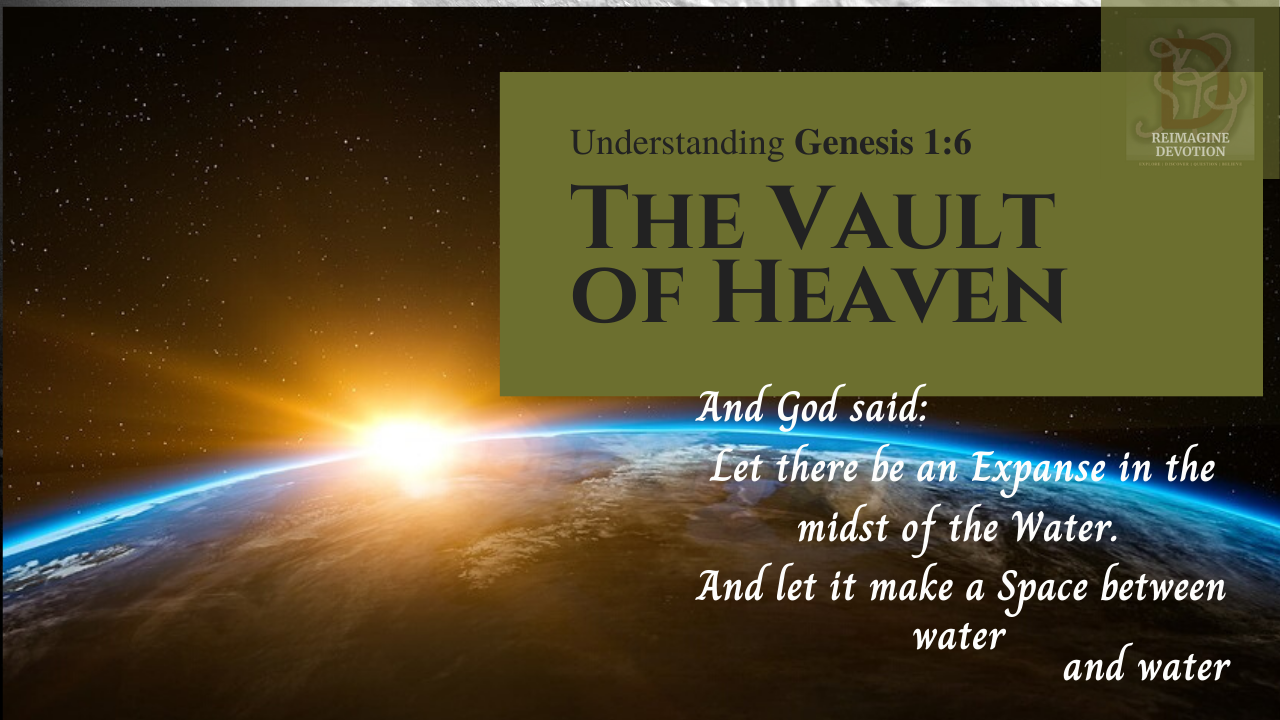On this little planet that we call home, there exists approximately 400 miles of vertical space between the surface where we walk, and the upper shell of our atmosphere.
Long before we reach 400 miles, the oxygen level becomes so thin that we would lose the ability to breathe, and the temperature so cold that we would freeze to death.
Beyond this shell, these short 400 miles, lies the most inhospitable, the most unforgiving, the most terrifying of all hostile environments: the vacuum of space.
The Second Creation
 After light in Genesis chapter 1, God creates the Expanse, bubble, a tiny strip of breathable atmosphere which makes life on this planet possible.
After light in Genesis chapter 1, God creates the Expanse, bubble, a tiny strip of breathable atmosphere which makes life on this planet possible.
The word expanse here, in the Hebrew language, refers to a solid barrier. In the ancient world, it was known as the Vault of Heaven, a solid dome that fit over the top of a flat earth.
A different kind of Universe
To understand the Genesis story, we must picture the universe as the ancient writer would have imagined it. This will be the subject of the next post in this series, Genesis chapter 1 verse 7. But we will begin the exercise now.
Picture first, a single, giant ball of water.
This is “the Deep,” the great primeval ocean, the only thing that exists at the dawn of time. There is no surface. Only God is outside the waters. Inside this chaotic water, God first creates “light.”
Then God speaks for a second time, and a space opens in side the water. A solid barrier comes into existence, pushing half the water up and half of the water down. The water that was pushed up becomes the blue sky. The water pushed down remains as the ocean, or the Deep.
As knowledge grows
When the ancients looked up, they saw water. When they looked down, water. They imagined that the crust of the earth floated on the surface of a giant sea, and that the blue above was the same as the blue below. Really, what else were they supposed to think?
They wrote a story based on what they saw: Water above, and water below. Because all good stories are based on observation of the real world.
The details, however, and whatever scientific flaws they may contain, is not the point. The story is, what it means, and the revelations about ourselves and God that we can still take from that story. When the writer of Genesis 1 tells us that our world is surrounded by water above and below, he means to point out the miracle of our world existing at all.
The ancients found themselves completely surrounded in a hostile environment – the water, the deep, the ancient symbol for chaos, oblivion, and death.
Today, we know that the universe looks a bit different.
Still, the basic point remains the same now as it was then. In fact, the more we learn about the universe, the great expanses of space, and the crazy number of coincidences that all had to coincide to make life on earth possible, we are compelled to find our existence even more unlikely.
Science does not drive us further from the miraculous. In fact, there is no greater proof of how profoundly unlikely life actually is.
The miraculous
We humans exist in a pocket, 400 vertical miles between us and the vacuum of space.
Just to put this into perspective, it would take about five hours to drive that distance on the freeway.
The diameter of the Earth, from one pole to the other, is 7,900 miles.
The circumference – that is, the distance we would travel along the surface of the planet, from one pole to another and back again – is 24,900 miles.
The distance that light has to travel from the sun to the earth every second of every day is about 92,960,000 miles.
And compared to the size of the entire universe, our planet is basically microscopic.
Inside these unbelievably vast dimensions, God has created a pocket, 400 vertical miles, on which our survival depends. So dependent are we on our Creator, and so loved.

When confronted with the immensity of the Universe, people of faith tend to have one of two reactions. Either we feel tiny, insignificant, and disconnected from our Creator, or, the unlikeliness of our existence magnifies the love our creator must have for us. Which of these reactions do you have? Why?
Missed the last few verses? Catch up with Understanding Genesis 1:5.
or
Move on to Understanding Genesis 1:7 now!

amazing I must say that this is a clearly amazing review on the vault of Haven understanding.. this is such a comprehensive say clearly written from reference of the gospel and its really intriguing… you did really an amazing job putting stop an amazing review…… awesome article keep it up
The ancients were no way ignorant as portrayed in this article. We are the ones who have been indoctrinated (educated) into abandoning our senses for falsehood in the name of “science”. How did that work out with COVID? If the Bible states that the “firm-ament” separates water above from water beneath, where then is “space”? WAKE UP!!!
Well, the Bible does state that a firmament separates the water above from the water below. That, as a simple matter of black-and-white fact, is the word, a totally accurate/valid translation for the Hebrew word “raqya.” As for other translations, such as “expanse,” that I gather you would prefer (and which would also be accurate translations, because translation is not and never can be an exact science…), I do have to return your question: “If the Bible states that an “expanse” separates the water above from the water beneath, where then is “space”? Whatever way you do translate this word, the “expanse,” and more particularly where it is placed dividing water from water, is problematic and has to be accounted for. Creationists, for example, theorize that there were vast stores of water in the atmosphere before Noah’s Floor, thereby accounting for “the water above,” but creating another problem. Genesis 1, Creation Day 5 states: “Let there be lights [stars/moon/sun] in the expanse of the heavens…” (Gen 1:14, emphasis mine), which means the expanse itself must be outer space, right? According to modern, scientific, cosmology anyway. Also, the “expanse” is named “heaven” (Gen 1:8), a term which in itself suggests outer space, and is, in the ancient world, a reference to the daytime sky or the stary night sky, where the gods were thought to dwell. In any case, whatever way you look at/translate it, eventually you run into this problem – the “water above” is, according to everything written in Genesis 1, “above” what we now understand to be outer space… Does this make the ancients ignorant? In my opinion, no. In my opinion, these are sophisticated, well-reasoned explanations for what ancient people were able to observe and experience and make of their world. You are the one who leaps to the accusation of ignorance based, I suspect, on your own preconception that modern knowledge is “better” than anything else, simply because we happen to be born in a time and place that is capable of sending cameras into outer space to get a scientifically accurate picture (literally) of what the universe looks like.
I agree with you because I was indoctrinated as well into Catholicism
Thanks! I’m actually getting back to this website after a bit of a break, and words like these are so encouraging!
Sometimes I try to imagine what was the beginning of time and where are we all in this vastness of the universe. I realise that because we don’t really know, even though so much research has been done, I am happy to know that behind all that I can imagine is the author, God, who loves and cares for me at all times and I am thankful
Those are pretty close to my feelings too. I think a big part of faith, what makes it so important and so miraculous, is standing back and knowing that, no matter what all the scholars and all the scientists ever do or do not discover, God is there, God his here, God’s plan for this universe will unfold, and we are a part of it, no matter what.
Awesome! It is very difficult for the human mind to comprehend the creation account in the first chapter of the book of Genesis. My take is: God loves us so much, He created everything we would need in a very orderly manner. First He created light. Then He created the sky, atmosphere and the seas. The writer of Genesis is right in referring to the clouds and oceans as water with the atmosphere in between them.
“God loves us so much” – yes, that is exactly the point of Genesis 1, and the rest of the bible. For the writer of Genesis 1, the ultimate proof of God’s love was the order God brought out of chaos, creating in an orderly way, as you say. Other writers have other ways of describing God’s love, but the love is always their point in the end.
Hey nice article you have there, your thoughts are indeed invaluable. I have gone through that verse before now, but I didn’t get more insight like the one highlighted in this article. I am glad to have gotten a deeper knowledge and understanding in regards to the mighty works of God. I will forever remember this day, God bless. Keep the good work, warm regards
Thanks! I’m glad you found something useful here. I’ve read this chapter so many times, and I still find new things myself.
I’m so excited to see Genesis in a different view just from these few verses. I see the dome/ vault as a safe that protects God’s creation. I noticed how He didn’t breath man until everything was available for him to survive. He was providing for our survival from the beginning.
A beautiful summary! Thanks for sharing!
Great article!
Thanks!
Thank you . But are you saying earth is indeed a ball??
I read earth was formless and void, and I don’t understand where God structures a ball from this. Vault is made from what?
Difficult to conjecture !
There are different ways to understand all of this, of course, and a lot of it comes down to faith and what people individually believe. For myself, as a trained historian and linguist, I default to what the words mean in the ancient languages and what the original writers, in their context as ancient people, are most likely to have thought/intended to communicate. As a pastor, however, I always seek the deeper meaning afterward, and tie that deeper meaning into what we now know to be true. The terms “formless and void” in no way suggest a ball or spherical shape to the earth, and, indeed, it is almost impossible to believe (from a historical perspective) that the ancient writer of Genesis would have had that image in mind. The people of the Ancient Near East believed the earth was flat and rested on a bottomless ocean with a solid dome (i.e. the vault of heaven) overhead. That is the image that the Genesis story itself suggests, which makes sense given the time in which it is written. But the meaning in what is written goes much deeper, suggesting that God protects the earth in a way that allows life to develop and flourish. And that same meaning can be found in what we now know about the atmosphere and many other aspects of how the earth – and even our entire solar system – is set up.
Just an opinion but use of the English word “vault” rather than “expanse” as many other bible translations use, is confusing, misleading, and less readable. The word vault first brings to my mind a space enclosed in a stone or concrete vessel. This is the normal first definition of a vault.
The thing is, the term “vault” (including its implication of a closed dome) is just as accurate (in my opinion, actually more accurate) to the Hebrew as other English terms and is also more accurate to ancient conceptions of how the universe looked – and therefore, more likely to be what an ancient writer would have in mind. Such terms are only misleading because they contradict our modern conceptions/what we now know to be true. If our goal is actually to understand what the bible means, then we have to leave our own preconceptions behind and look at – well – what the bible actually does and does not say. This is especially important when certain groups try to argue that certain words in the bible (like “expanse,” for example) suggest that the ancient Hebrews understood what the universe “really looked like” better than they should have been able to in ancient times. The argument from there is that because the people who wrote the bible knew what the world “really looked like,” they must have been inspired by God (and, by inference, anyone who can’t see that is just being willfully ignorant). But this is a false argument because, actually, the words in the ancient languages and in their original context do not suggest any “special knowledge.”
I AM MORE INTERESTED,INYHE CHAPTER,WHERE,God, created, Adam. The wsy that I under stand it,is that,after Gd, created ADam, He left,and,from what I get out of this,(while He was gone) He was doing some more (creating),you might ask why, I say this. If you go to chapter (2) verses,8 through,18,it tells where G0d,cam,back, and takes Eve, out of Adam, now, go to chapter (4). CAIN SLEW Abel. THESE WERE THE ONELY ,TWO CHILDREN ,THAT ADAM&EVE, HAD UP TO THIS PT. SKIP ON UP TO THE ,WHERE cain slew His brother, After a while, God came back and confronted cane about hls brother,as we read on, wewe know that,God kicked Cain, out of the Garden, and, as we continue reading, we find out that Cain, went to a city, called Nod, where he found a wife, and started a family., My question is,(while God ) was away, and Adam was still asleep, and God had not made Eve,yet, was God creating, other,Civilations?
THE ,REASON i ask this is, where did Cain get a wife.
You bring up some good points. There are a few ways to look at it that all (I think) fall into one of a few basic categories.
First, if the first chapters of Genesis are indeed JUST history. Second, if the first chapters of Genesis are JUST myth/legend. Third, if the first chapters of Genesis are some mixture of legend/myth AND history. Creationists, for example, make the bold claim that these chapters are JUST the 100% factual history of how God created the world. Knowing the stories as well as I do, having read these chapters in the original Hebrew, and studied myth/legend and ancient storytelling/history/writing extensively, I find that option to be incompatible with the stories themselves for several reasons, the most significant of which are:
(1) Genesis chapter 2-3 – as it is written without the intervention of later interpretation/tradition – actually tells a completely different story from Genesis chapter 1 in which God creates in a different order. Genesis 1 starts with light and moves on to water, earth, plant life, stars, animal life, and finally, humans. In Genesis 2, the earth exists (presumably as God’s first act of creation), and from the earth, God creates the human being (Adam). God then goes off and creates plant life (particularly, one special Garden). But the human is lonely, so God THEN creates all other animals (our English translations make an effort to smooth over this contradiction by translating the relevant phrase “God had (already) created.” This translation is not accurate. The best translation for the Hebrew is “and (then) God created…”). Since none of the animals are a suitable, equal companion for the human, God then creates a second human, which also represents to division of humanity into the two genders, male and female.
(2) As you point out, there is a great question of who Cain’s wife was, and also why other people do seem to be living in the land to which Cain is exiled. If these chapters are ONLY history, then all of these other people must somehow be Adam and Eve’s children, which is indeed possible, but again, when just reading the story as it is written, does not seem to be the case.
(3) If you insist that the early chapters of Genesis are ONLY history, much of the symbolic meaning of these chapters is necessarily lost. In other words, these stories actually MEAN more if they are symbolic/mythological.
It is important to note that the same cannot be said for the Gospels or other historical accounts in the New Testament. These accounts MEAN more if they are historical as opposed to legendary – and have pretty much no meaning at all if they are ONLY legendary. Ironically, though, the New Testament books, particularly the Gospels, do make overt claims to be historical accounts based on eye-witness testimony (see the beginning of Luke’s Gospel, for example) and, historically speaking, we have more reason to see them as valid, First Century historical documents than not. The same cannot be said for Genesis, which makes no internal claim to be 100% factually historical, and is, historically, far older and more difficult to verify than anything in the New Testament. So, anyone who tells you that to dismiss the historicity of Genesis is the same as dismissing the historicity of the Gospels is misrepresenting the historical reality of these documents themselves.
In any case, Genesis chapter 2 and the creation of Adam and Eve is one of my absolute favorite parts of the bible, and I will be diving into greater detail with it soon (hopefully!)